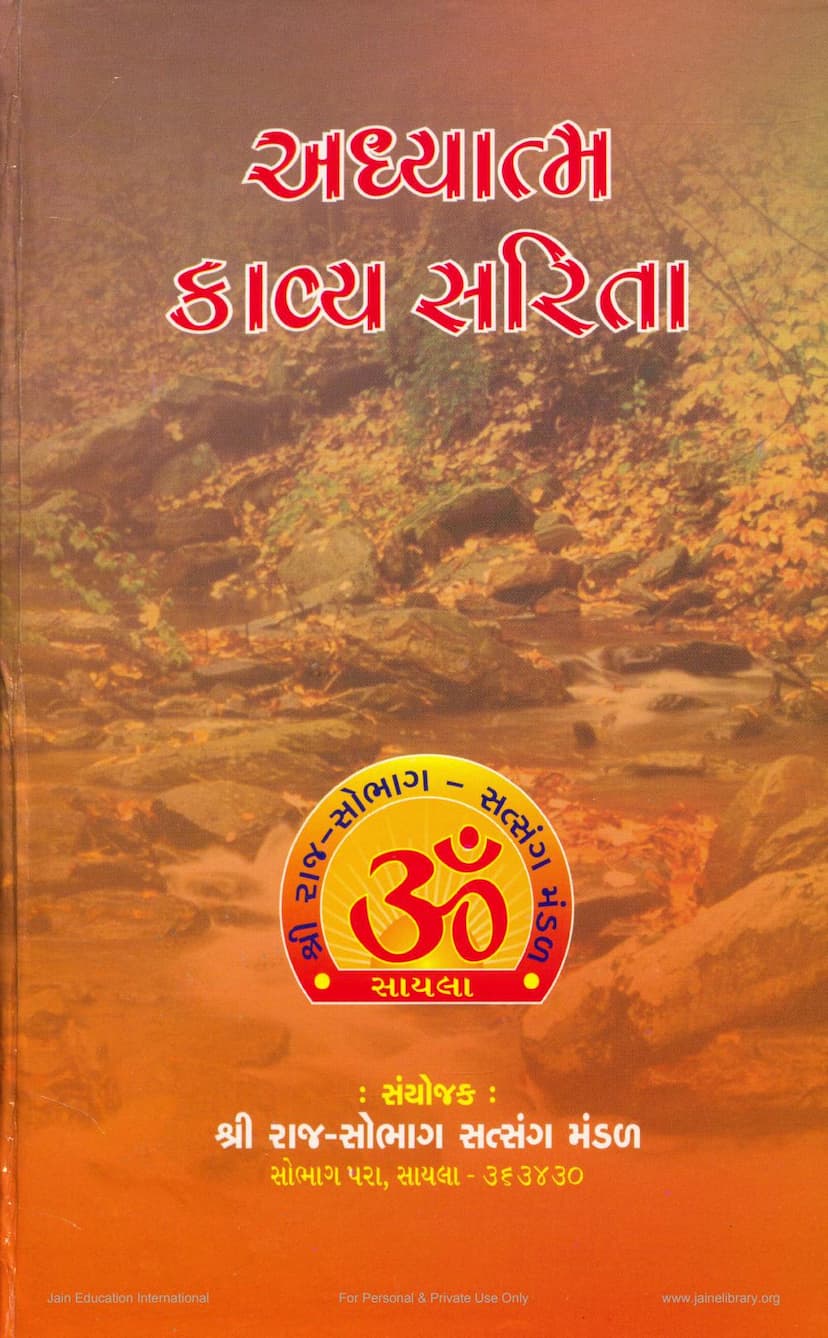Adhyatma Kavya Sarita
Added to library: September 1, 2025

Summary
This document is the title page, publisher information, and table of contents for the Jain text "Adhyatma Kavya Sarita" (Spiritual Poetry Ocean).
Here's a summary of the provided pages:
-
Page 1-3: These pages contain the title of the book, "Adhyatma Kavya Sarita," and the publisher information: "Raj Saubhag Satsang Mandal Sayla." It lists contact details for their ashram in Sayla, Gujarat, India, and also provides contact information for representatives in Ahmedabad and Mumbai for book distribution. It mentions the first edition and the number of copies printed.
-
Page 4-5 (Prastavana - Introduction): This section, titled "Prastavana," introduces the book. It emphasizes the supreme importance of devotion (bhakti) as the highest path, capable of leading to liberation quickly when practiced near a spiritual master. It quotes Shrimad Rajchandra, highlighting that devotion eradicates ego and self-will, guiding one onto the right path. The introduction explains that for the last 31 years, the ashram's daily program concludes with singing devotional songs composed by enlightened beings. It mentions that Sadgurudev P.P. Bapuji Shri Ladakchand Maneckchand Vora compiled these profound verses himself at the age of 16. The text further elaborates on the diverse spiritual emotions expressed in these poems – compassion for beings, spiritual ecstasy, intense devotion, and the attainment of fearlessness. It compares the poems to fragrant flowers that influence the world, stating that these verses awaken inner consciousness. The introduction also touches upon the depth and wisdom contained within these concise poems, how even extensive explanations struggle to fully capture their essence. It speaks of experiencing the selfless love of saints when the mind stabilizes while listening to these verses, and how the soul and mind, once impure, become pure by bathing in this "ocean of spiritual poetry." The poems are presented as solutions to life's problems, offering the nectar of the soul and revealing that true happiness lies not in possessions, wealth, or power. It suggests that these verses help understand the unified inner experience of great souls across different religions and philosophies, breaking material attachments and leading to the soul's detachment. The introduction concludes by mentioning the inspiration behind this compilation – a booklet was created for devotees living abroad, which was later expanded. It announces the book's release on November 3, 2007, during a literary session. It also acknowledges the financial support from the Panchali family and the careful correction and editing by Professor Chandrikaben Pancholi and Dashrathbhai from Nishadh Printers. The sincere prayer is that this "Adhyatma Kavya Sarita" inspires readers to reside in their true self, not in sectarian affiliations.
-
Page 6 (Dedication): This page is a dedication to Sw. Lalitabehn Virchandbhai Panchali and Sw. Virchandbhai Bechardas Panchali. It states that though their physical bodies are no longer present, their spiritual, honest, pure, and loving personalities remain alive in the hearts of the devotees. Their self-realized life vision is considered an inspiration for true knowledge, making the present life fragrant. It offers a wish for their eternal peace through the worship of the Omniscient Lord and expresses a prayer for their presence as seeds of true knowledge in their lives. The dedication is from the Panchali family, represented by Dr. Dhirubhai Virchandbhai Panchali.
-
Page 7-166 (Anukramanika - Table of Contents): This is an extensive index listing over 189 devotional songs (Adhyatma Pad) with their corresponding page numbers. It covers a wide range of devotional themes, many of which appear to be in Hindi and Gujarati, reflecting a rich tradition of Bhakti poetry. The titles suggest topics like:
- The state of the mind being absorbed ("Man Mast Hua")
- The nature of divine love ("Yeh To Prem Ki Baat Hai Udho")
- Experiencing divine wonders ("Acharij Dekha Bhari Re Sadho")
- Recognizing the inner self ("Olakhho Andarwalo")
- The path of devotion ("Agar Hai Prem Darshankā")
- Surrender to the divine ("Ab Sauṁp Diya Is Jīvanko," "Ab Ham Anandko Ghar Payo")
- The divine's presence and relationship with the devotee ("Aapanne Tara Antarno Ek Tar," "Rāṁg Rangbhīnā Māre")
- The Guru's importance ("Guru Ghar Āvyā Te Divāḷī," "Guru Binā, Kaise Lage Pār")
- Praise of various Tirthankaras (e.g., "Shri Anant Jinshu Karo," "Abhinandan Jīn! Darishana")
- The ephemeral nature of the body and worldly attachments ("Janm Tērā Bātōṁ Hī Bīt Gayo," "Man Phūlā Phūlā Phire Jagatmeṁ")
- The search for the divine within ("Kya Shodhe Sajani?")
- The nature of the soul and divine realization ("Chaitanya Aisa Gyān Vichāro," "Meṁ Merā Sata Chit Ānandrūp")
- Devotional practices and supplications ("Lagō Chhō Pyārā Pyārā Kṛupāḷudēv," "Hāṁre Maraṁ Maraṇarā Sāthī")
- The power of divine grace and surrender ("Terā Rājī Karēṅgē Bēḍō Pāra," "Ab Jāgō Paramguru Paramadēv Pyārē")
- Various forms of devotion and surrender to God and Guru.
- The index also includes sections for "Adhyatma Gathao" (Spiritual Narratives), "Stuti" (Praise), specific deity praises (Shri Manibhadra Dev, Shri Padmavati Mataji, Shri Mahalakshmi Devi, Shri Ghantakaran Mahavir Mantra), Aarti, Mangal Deep, and concluding prayers and rituals like Pratikshalan and Pooja Duha.
- Finally, it includes an alphabetical index for the songs.
In essence, "Adhyatma Kavya Sarita" is a compilation of devotional songs and hymns, deeply rooted in Jain spiritual traditions, with a strong emphasis on the path of devotion, the importance of the Guru, and the realization of the true self. The songs likely explore various aspects of spiritual journey, including surrender, detachment, inner peace, and the praise of divine figures.